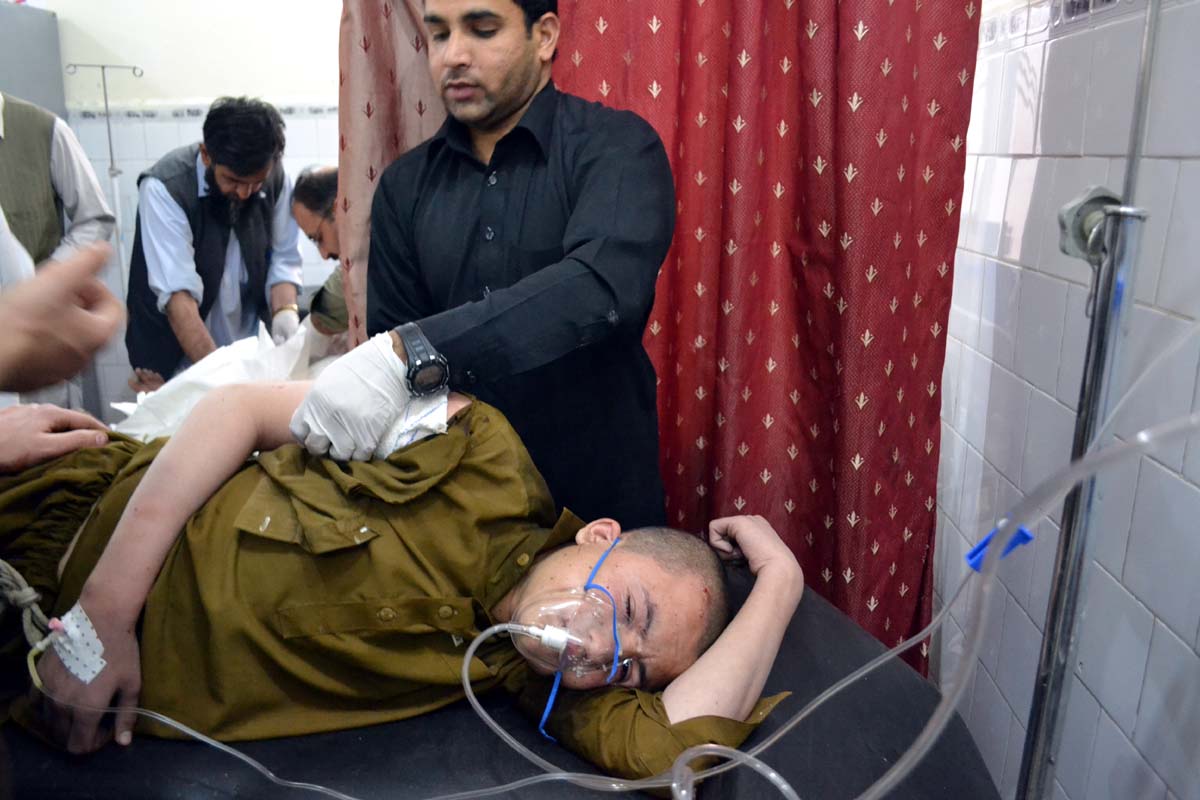
Peshawar: Qadir Siyaal, 38, is sitting on a plastic sheet outside the chest ward of Khyber Teaching Hospital (KTH) Peshawar. His mother has developed chest infection. “She is suffering from breast cancer and needs special care for the infection but the doctors here are least concerned to give her special treatment,” Siyaal laments.
He told News Lens Pakistan that it took the doctors three days to diagnose his mother’s ailment, which has aggravated her condition.
Just like any other patient, he is concerned if the pollution spread across the length and breadth of the hospital would infect her mother further. “Have you looked around the hospital, the stink from the open sewerage, the mosquitoes swirling over the stagnant water, the uncollected debris, the hospital waste lying open? Will this not make our patients sicker,” asks Siyaal.
Khyber Pakhtunkhawa (KP) has more than 1,600 government-run health facilities where 63,300 employees are providing services to the people. Each district has a network of facilities such as basic health unit, civil hospital, rural health centres, dispensaries, tehsil (town) and district headquarters hospitals but the services have not been satisfactory due to which people avoid visiting these hospitals.
In a brief sketch about the condition of hospitals in KP, Doctor Alamgir Yousafzai, President Young Doctors Association KP narrated the story of the only kidney hospital in KP. The hospital receives 400 plus patients on daily basis in OPD, while the hospital possesses only three units, each comprising five beds. Dr Alamgir informed that since the establishment of the Hayat Abad Medical Complex 27 years ago, no other hospital has been built in KP.
Director KTH, Doctor Farman Ali, refuses to agree that the government is oblivious of the present situation or is doing nothing. He says that every reform takes time to become palpable. “It is not possible to thrust change, we have to go about it incrementally for effective development,” says Ali.
When asked about the unhygienic condition of the hospital Dr Ali could not agree more. He told News Lens that the sewerage system of the hospital was not functioning, and draining water has become a chore. He said the government is trying to resolve this issue.
The Pakistan Tehreek-e-Insaaf led government in Khyber Pakhtunkhwa (KP) has been committed to bringing the health sector of KP in line with the modern medical system operated in the developed countries. In a manifestation to this commitment, the provincial government passed The Khyber Pakhtunkhwa Medical Teaching Institutions Reforms Act, 2015.’
Under the Act, the government owned medical teaching institutions and affiliated teaching hospitals have been given the autonomy to improve medical education and patient care by introducing reform programs.
The new system the administrative structure of hospitals has been revamped. A board of governors is set-up for each medical teaching institution to improve the affairs of the health sector.
The Independent Monitoring Unit is established to regularly evaluate performance of the healthcare facilities and take measures to improve quality of services. Independent Monitoring Unit is a government run programme. It is a three-year project. The project titled ‘Access to services, availability of staff and improving quality of services’, will operate through dashboard system where data from anywhere in the province will be displayed to the high-ranking officials.
The Project Director of IMU, Doctor Akhtar, defends the government saying that the reforms are linked to technology and it will take time for the people, the doctors and the monitoring staff to get acclimatized with the new set-up. He is positive that with time things will start moving at the right pace.
According to Dr Akhtar Rs 35 billion has been allocated for the health sector in the current fiscal year. But he believes that unless the government plans for a 15 percent raise in the budge on year on year basis the changes envisaged by the government will not be sustainable. He is confident that the present government will keep adjusting the health budget with the increasing demand and to maintain the level.
Iqbal Khattak, a member of the Institutional Medical Committee KP, told this scribe that most of the staff and doctors, did not know about the reforms and changes the government has introduced. He warned that lack of awareness could create hurdles in the implementation of laws and regulations concerning health sector.
Khattak says that to make matters worse the doctors keep going on strikes to influence government’s decisions. He told News Lens, that the doctors were legally prohibited from going on strikes. But because of poor law enforcement mechanism the doctors are least bothered to respect the law.
He maintained that so far the government’s reform initiatives are on papers only. “Unless patients start getting relief, we cannot say the PTI government has been successful in implementing modern techniques to reform the health sector of KP,” said Khattak.



